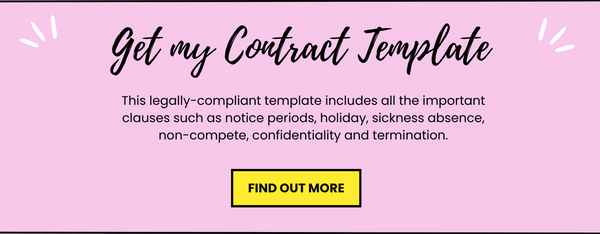Ideas for managing Pay & Benefits on a shoe-string budget


Why do your people come to work each day? Primarily, it’s so that they can pay their bills and fund the lifestyle they want. So, getting their pay and benefits spot on helps to attract and retain star talent. 🌟
The thing is, different people are motivated by different things. 🤔
One employee might value the opportunity to buy more annual leave to cover the six weeks school holidays. Another employee might only be interested in bonus payments. It often depends on what stage in life they’re at too. That’s why most companies offer a suite of pay and benefits to appeal to a variety of different preferences.
In this blog, I talk about some of the financial benefits that have worked well for my clients in small and medium businesses. 👇 This isn’t an exhaustive list by any means. But, it might just give you some inspiration!
WHY FINANCIAL INCENTIVES MATTER – EVEN IN SMALL BUSINESSES!
Corporate organisations tend to offer sticky benefits packages to attract and retain staff. More smaller businesses should do the same.
And while they’re not the be-all and end-all, financial incentives do help to:
✔ Lure talent from your competitors
✔ Motivate staff to work better together
✔ Recognise employees who’ve done a great job
✔ Keep employees working for you for longer
✔ Improve your cash flow situation (see below 👇)
YES, THEY HELP WITH CASH FLOW TOO 📈
It sounds bonkers, but financial incentives can actually help to motivate your employees while keeping your cash flow healthier. This is because some incentives don’t need to be awarded from the get-go, or even on a monthly basis within a salary.
For example, think about when you make a job offer to a new hire. You’ve found a super-duper candidate, but they’re asking for more money. Salary negotiations can be tough going, right? 💪
One way to keep salary costs down in the short term – until your prospective employee has proven themselves – is by offering other incentives as a sweetener. For example, a one-off bonus payment AFTER their first 12 months if they smash a target you’ve set them.
💡 Mandy’s tip
When recruiting, always set the advertised salary 10% lower than you can afford, to allow for salary negotiations.
REGULAR SALARY REVIEWS AND OPPORTUNITIES FOR PROMOTION 🔝
Committing to review an employee’s salary – say annually – can be a great way to boost engagement. You don’t necessarily have to award them a salary increase each year, just agree to review it against their performance and external industry benchmarks.
Also, offering your employees opportunities to progress up the ladder is another way to incentivise staff to perform and access more financial rewards. When they can see a future for themselves in your company, they’re more likely to stick around, right?
ANNUAL BONUS AWARDS 🏅
A company bonus scheme is a popular way for employers to motivate their staff to work together and try to achieve more for the organisation. These schemes can be mandatory or opt-in. And, you don’t need to pay them until the end of the year.
From the perspective of your employees, they often work well because they literally are a bonus. That element of surprise can be strangely appealing. In other words, waiting to see if you will or won’t get a bonus and how much it’ll be! 🤔
In terms of figuring out what performance levels should trigger a bonus award, you could define your performance indicators through KPIs and OKRs. Check out a blog I’ve written that’ll help you out with this. It’s called: OKRS OR KPIS? WHAT'S THE BEST WAY TO BOOST TEAM PERFORMANCE?
PAYING FOR OVERTIME
Overtime is a controllable way of awarding financial compensation to those employees who work beyond their set hours. And in some industries, employees depend on overtime to supplement their salary.
However, most employees tend to work more than what’s in their contract. So sometimes, it can set a dangerous precedent.
I’ve written a blog about overtime that may prove useful. It’s called: IS IT OKAY TO ASK MY STAFF TO WORK ON THE OCCASIONAL WEEKEND?
OFFERING MORE TIME OFF 📆
In my experience, one of the most popular staff incentives, is allowing employees to buy more annual leave from you. This is especially useful to parents who can’t find childcare in the six weeks school holidays.
It can work in many ways. For example, via a salary sacrifice arrangement. In other words, the extra time off is deducted from their pay on a monthly basis.
HEALTH AND WELLBEING INCENTIVES 🏥
More and more companies are offering insurances, assurances, and wellbeing perks – to empower their employees to look after their own health. While these kinds of incentives help to attract and retail talent, they also help to reduce sickness related absences too.
Popular incentive schemes include:
- Income protection policies that provide employees with a replacement income if they’re off work through illness or injury
- Private medical insurance that allows them to get private medical treatment, rather than going through the NHS
- Life assurance policies that pay a lump sum amount to your employee’s beneficiaries in the event of them dying in service
- Free eye tests for DSE users
- A Cycle2work scheme that enables your employees to buy a new bike without paying tax and national insurance on it
- Season ticket loans to cover the cost of travelling to work
DON’T FORGET PENSIONS!
As a result of the Pensions Act 2008, you’re required to enrol staff into a workplace pension scheme and contribute towards it. In the main, this is only if they’re over 22 years old (but younger than the state pension age) and earning over £10k pa.
Your employee can opt out of it if they like, but most staff want a pension in place to help secure their financial future.
It’s easy to forget pensions are financial incentives and you should include these as part of the benefits package you promote with your staff.
MAKE FINANCIAL INCENTIVES OFFICIAL 📑
Financial incentives – like purchasing extra annual leave – can alter the terms and conditions of employment contracts.
So, make sure your ‘people paperwork’ covers it all. This is so you limit any misunderstandings that might crop up. And, so you avoid making any unnecessary payments to your staff.
I recommend you have:
💪 A robust employment contract.
💪 A robust Pay and Benefits strategy that spells what incentives you offer your employees and how they should apply for them.
💪 A robust set of letter templates to communicate with your staff about your incentives.







